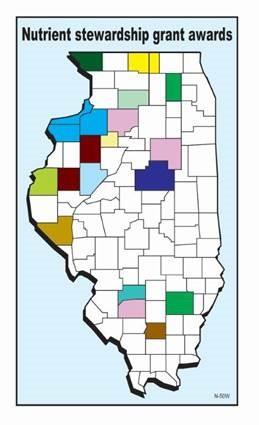By: Kay Shipman
County Farm Bureaus and their partners will expand nutrient stewardship work, going below the surface in several cases, thanks to Illinois Farm Bureau Nutrient Stewardship Grants.
IFB awarded its third round of Nutrient Stewardship Grants, totaling $100,000, for 18 projects to be implemented by 20 county Farm Bureaus and their partners around the state.
“This year’s grants step up the level of engagement of farmer members,” said IFB Director Jeff Kirwan of Mercer County. Kirwan chairs the state Nutrient Education Research Council and served on the IFB grant selection committee. “Illinois farmers are taking ownership of the future of the Nutrient Loss Reduction Strategy. We are starting to design and develop projects that allow us to test new ideas. We are creating new ways to reduce losses on our own farms.”

The 2018 projects demonstrate county Farm Bureaus’ creativity and willingness to lead on local nutrient issues.
“We are looking for county Farm Bureaus to provide leadership for the program. This includes board members, elected leaders and active members who take a role,” explained IFB Director Larry Miller of Franklin County, who served on the grant selection committee.
Lyndsey Ramsey, IFB associate director of environmental and natural resources, applauded county Farm Bureaus for their originality. “We are really excited for the innovation shown in these year-three projects,” Ramsey said. “Our members have great ideas, and county Farm Bureaus are taking the lead on nutrient loss. They are trying new practices and forming new partnerships in their local communities to tackle this important issue.”
Farm Bureau grant recipients include: Bureau, Clinton, Franklin, Fulton, Hancock, Jo Daviess, Kane, Knox, Lee, Livingston, McDonough, McLean, Pike, Stark, Washington, Wayne, Winnebago-Boone and a tri-county partnership of Henry, Mercer and Rock Island.
Selected projects include:
- Bureau County Farm Bureau will partner with Nutrient Stewardship of Northern Illinois to promote nutrient management and local practice results through year-round, weekly water sample tests. The project includes a summer field day and seminar.
- Clinton County Farm Bureau will work with many conservation, livestock, ag industry and academic partners to compare four cropping systems involving manure and cover crops, and highlight the impacts on soil and nutrient losses. Information will be shared with farmers, landowners, teachers and the public.
- Franklin County Farm Bureau will partner with county conservation agencies and the University of Illinois Extension in a demonstration comparing local common fertilizer practices to research-based application rates on cooperating farmers’ fields.
- Fulton County Farm Bureau will partner with the Metropolitan Water Reclamation District of Greater Chicago to demonstrate recycling of drainage water to improve usage efficiency of water and nutrients, and to reduce nutrient losses. Field days will be held at the demonstration site.
- Hancock County Farm Bureau will work with conservation agencies and groups to present four roundtable discussions featuring local speakers on four relevant conservation topics.
- Henry, Mercer and Rock Island County Farm Bureaus will partner with the Henry County Natural Resources Conservation Service (NRCS) and local FS member company on a conservation field day, featuring cover crops and the installation of a woodchip bioreactor.
- Jo Daviess County Farm Bureau will work with Stephen County Service Co., Extension and other conservation partners to continue a cover crop plot study that will include manure applications.
- Kane County Farm Bureau is partnering with the county Forest Preserve, and several other local government and conservation agencies to install and demonstrate a woodchip bioreactor.
- Knox County Farm Bureau will work with the county Soil and Water Conservation District (SWCD) to host a saturated buffer field day. A special focus will be monitoring results from a year-old local saturated buffer, a 2016 grant project, and its influence on nutrient losses.
- Lee County Farm Bureau will partner with Sauk Valley Community College on mobile soil testing laboratories to be used on the college’s new ag research fields and offered for use on local farmers’ fields. Collective information will be highlighted at a 2018 field day.
- Livingston County Farm Bureau will work with local conservation partners to provide an on-farm demonstration plot of cereal rye practices preceding a soybean crop. Information will be shared during a conservation field day.
- McDonough County Farm Bureau will continue a water testing project focused on nutrient and soil losses to help participating farmers analyze stewardship practice impacts.
- McLean County Farm Bureau will partner with the local SWCD and local ag retailers on a water testing project to help participating farmers mitigate nutrient losses.
- Pike County Farm Bureau will work with local levee and drainage and watershed districts, John Wood Community College, Prairieland FS and others to complete a water quality study in the Sny Levee District. On-farm nutrient stewardship work will be integrated into local field days and other outreach.
- Stark County Farm Bureau will work with the county NRCS to install a woodchip bioreactor and plan a bioreactor field day at the site.
- Washington County Farm Bureau will work with the local SWCD to test soil and water samples for nutrients, especially phosphorous, from participating farmers. The goal is to provide comparisons of conservation practice costs, nutrient savings and cover crops.
- Wayne County Farm Bureau will work with Wabash Service Co. and Wabash Valley College on two nutrient loss inhibitor demonstration field plots. Information will be shared during a summer field day.
- Winnebago-Boone Farm Bureau will partner with Conserv FS for an on-farm nitrogen movement study. Farmers and a local crops specialist will receive information to make better nitrogen decisions based on local soil types, crop rotation and fertilizer products.
Content for this story was provided by FarmWeekNow.com.